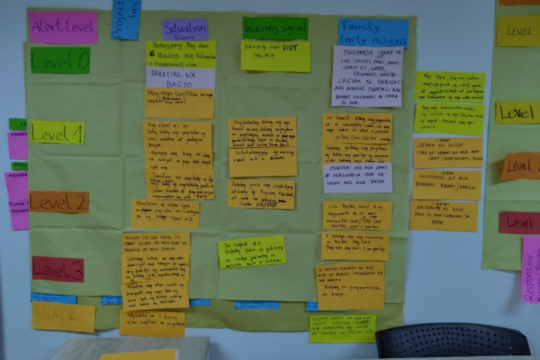Date: 20th June 2024
Time: 14:00 – 16:00 Bangkok time (GMT+7)
Platform: Zoom
Background
The inaugural meeting of the Asian Disaster Readiness Fund (ADRF) Committee represents a pivotal step in strengthening disaster preparedness across Asia. Established by the Asian Preparedness Partnership (APP), the ADRF is designed to empower local actors by providing flexible, tailored funding for disaster risk management. Housed within the Asian Disaster Preparedness Center (ADPC), the ADRF will support multi-sectoral partnerships and enhance regional cooperation. By addressing the critical funding gaps experienced by local entities, the ADRF aims to build safer, more resilient communities through locally led initiatives. The successful operationalization and implementation of the ADRF will demonstrate approaches that “leave no one behind.”
The main objectives of the virtual meeting of the ADRF committee were to orient them on the overall framework of the ADRF and share an overview of the implementation and management of the ADRF for discussion and feedback.
Dr. Sisira Madurapperuma, Director of Preparedness for Response and Resilient Recovery, on behalf of the senior management of ADPC, welcomed all participants to the inaugural meeting of the ADRF Committee. He highlighted the significance of this gathering in the context of localization efforts in Asia. He emphasized the potential of this initiative to set the tone for future work in disaster risk reduction (DRR) and climate action across the Asia-Pacific region. Dr. Madurapperuma underscored the importance of supporting locally led DRR, noting the challenge of limited funding for local organizations, which receive only around 2-3% of humanitarian funding. He advocated for partnerships among like-minded organizations to develop innovative solutions and access resources for local DRR and climate action, aligning with the philosophy of the Asian Preparedness Partnership (APP).

Welcome remarks by Dr. Sisira Madurapperuma, Director, PRR, ADPC
Introduction of ADRF
Dr. Sisira Madurapperuma provided an in-depth overview of the ADRF, explaining its origin under the APP and its evolution into a partnership. He discussed the ADRF’s role as a conduit for international development partners and donors to support locally-led DRR and humanitarian response operations. He highlighted that the main objective of the ADRF is to “Strengthen the preparedness of local actors to anticipate risks and accelerate emergency response and recovery through multi-stakeholder approaches.” Dr. Madurapperuma emphasized the necessity of proper governance and the peer review process, ensuring that ADRF funding effectively supports local organizations and influences global funding norms to prioritize local initiatives.


Orientation on Implementation and Management of the ADRF
The next sessions by the APP Secretariat included a briefing on the TOR for the ADRF Committee, outlining the roles, responsibilities, principles, criteria, and governance structure. This was followed by an overview of the ADRF implementation and management guidelines, emphasizing the roles and responsibilities for managing the fund collectively. The eligibility criteria for applicants, the application, review, selection process, and the main components of implementing the sub-grants were presented. The importance of promoting localization and advocating for fundraising for the local actors under the ADRF was also stressed.

Operational process to be followed under the ADR
Following the overall operational procedure of the ADRF, the main components of the first funding cycle under the ADRF were introduced. The snapshot of the first funding cycle included the main objective of “strengthening sub-national and local organizations for disaster preparedness through partnerships, community engagement, inclusive approaches, and joint locally-led actions”. The four key thematic areas under the funding cycle include:
- Strengthening forecast-based, locally led early warning and early action systems to reach at-risk last mile communities.
- Enhancing multi-hazard contingency planning and emergency response plans, policies, and strategies at the local level.
- Integrating climate risks by strengthening locally-led climate change initiatives and community-based adaptation.
- Enhancing community resilience through Community-Based Disaster Risk Management (CBDRM) approaches.
The discussions followed the presentations, which generated rich feedback from the ADRF Committee members and inputs on the ADRF guidelines and implementation. Mr. Asith D’ Silva, the nominee from Sri Lanka and the Chairperson of the ADRF Committee, acknowledged the productive discussions and the importance of the ADRF in supporting local DRR initiatives.

Questions and Feedback Session with the ADRF committee members


